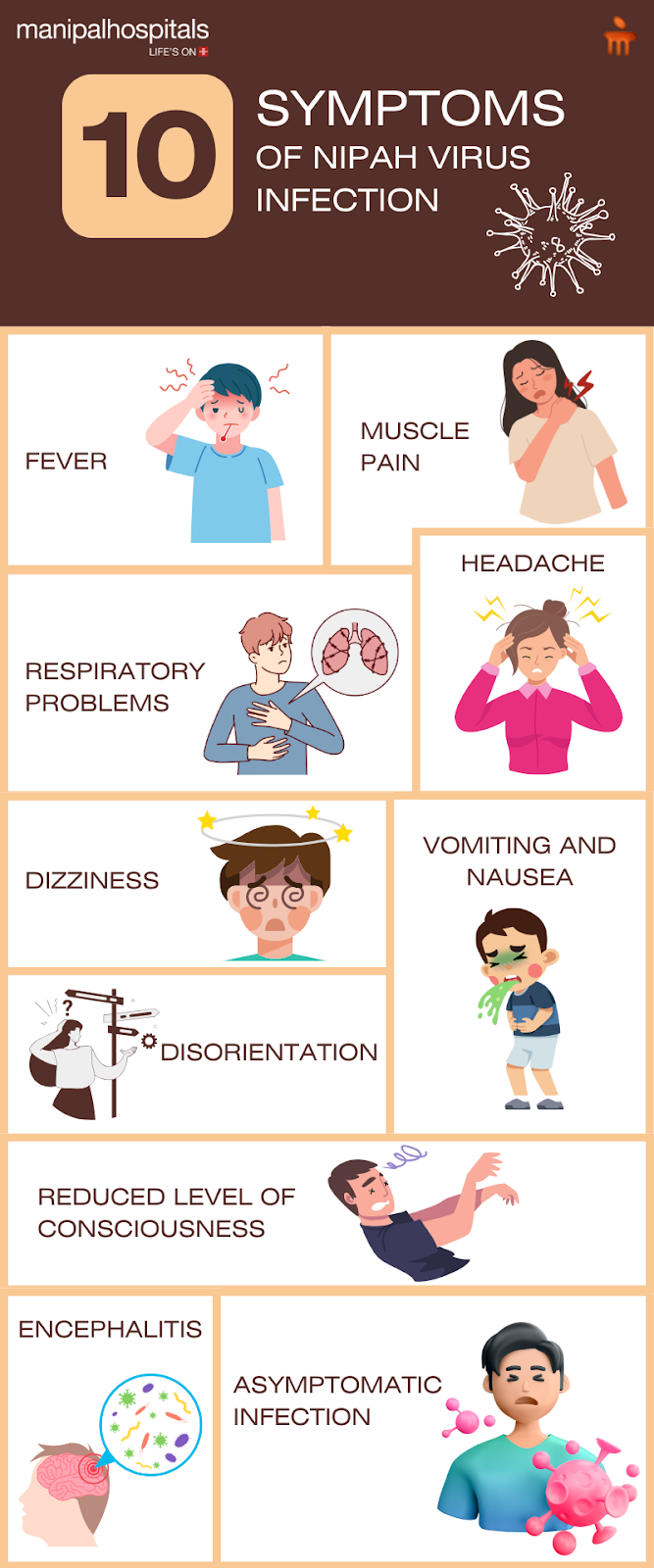
The entire nation in general and the state of Kerala, in particular, is on high alert following the outbreak of the Nipah virus infection in the state. The rising Nipah virus cases in India have led to increased fatalities and raised alarm bells. With each new case, the potential for the virus to spread to other regions of the country becomes a growing concern. This deadly disease has already claimed a few lives and left many hospitalised.
The Nipah virus has a mortality rate of 40% to 75%, making its containment a top priority for the government. In this article, we have discussed the symptoms, causes, diagnosis, treatment and prevention techniques to avoid getting infected with this deadly virus.
What is the Nipah Virus?
Nipah virus (NiV) is a newly-emerging zoonosis, i.e. a disease that is transmitted from animals to humans and causes severe disease in both. It belongs to a genus called Henipavirus, named after the Kampung Sungai Nipah village in Malaysia, where it was first identified in 1998, it affects the brain of a person. In 2004, some people in Bangladesh got infected with this virus after consuming palm sap contaminated by fruit bats.
It is mostly transmitted by fruit bats (also known as flying foxes), although it can also be transmitted by pigs and other animals such as goats, horses, dogs, or cats. The virus shows transmission when:
-
People or animals have come into contact with an infected animal's bodily fluids (blood, excrement, pee, or saliva).
-
People consume meals polluted by diseased animals.
-
People come into contact with a person who has the Nipah virus regularly, frequently when caring for them.
What Are The Symptoms of Nipah Virus Infection?

The symptoms of NiV are similar to those of any viral infection, including:
-
Fever
-
Muscle Pain
-
Respiratory problems
-
Headache
-
Dizziness
-
Vomiting and nausea
-
Disorientation
-
Reduced level of consciousness
-
Encephalitis
-
Asymptomatic infection
-
Coma.
How is Nipah Virus Infection Diagnosed?
NiV can be diagnosed by conducting a few tests. They are:
-
Histopathology: A detailed, microscopic study of tissues
-
Serology: blood tests to view the antibodies
-
PCR (Polymerase Chain Reaction): To detect the presence of viral DNA
-
Serum Neutralisation Test: To evaluate levels of protective antibodies in a patient’s serum
-
Enzyme-linked Immunosorbent Assay (ELISA): A technique for detecting and establishing the levels of substances like proteins, antibodies and hormones.
What Is The Treatment for Nipah Virus Infection?
Currently, there is no vaccination or a cure of a permanent nature to combat this virus. Intensive supportive care is the primary treatment for this disease. Ribavirin, an antiviral drug used in the treatment of Hepatitis C may have some effect on this disease. Nipah virus necessitates a symptom-focused approach to treatment. This typically involves:
-
Maintaining proper hydration
-
Getting adequate rest
-
Using pain relievers like acetaminophen or ibuprofen
-
Utilising medications to reduce nausea or vomiting
-
Employing inhalers or nebulizers to address breathing issues
-
Administering antiseizure medications, if a seizure occurs.
Researchers are actively investigating the potential use of monoclonal antibody treatment for the Nipah virus treatment as a subject of ongoing study.
Precautions To Prevent Nipah Virus
In the event of an outbreak, individuals need to adhere to the following preventive measures:
-
Refrain from contact with ailing pigs and bats.
-
Maintaining regular hand hygiene by washing hands frequently with soap and water.
-
Take caution regarding the consumption of potentially contaminated foods and beverages.
-
Avoiding direct interaction with individuals known to be infected.
-
Strictly avoiding any contact with the blood or bodily fluids of an infected person.
-
Avoid consumption of fruits and berries which are left over after being bitten by bats and other animals.
-
Avoid consumption of palm sap or toddy collected from areas where fruit bats are found.
-
Infected individuals need to be hospitalised and isolated immediately.
-
Keep water sources clean and covered.
FAQs on Nipah Virus Outbreak
1: How did the Nipah virus start in India?
There have been several outbreaks of Nipah virus in Kerala, some of which have been traced to fruit bats. The National Institute of Virology, Pune, confirmed the first case of Nipah virus in Kerala in May 2018.
2: How does the Nipah virus spread?
The Nipah virus (NiV) can be transmitted to individuals by Direct contact with diseased animals, like pigs or bats, or their bodily fluids (such blood, urine, or saliva), consuming food items that have been tainted with an infected animal's bodily fluids (such as fruit tainted with an infected bat's juice or palm sap).
3: How is the Nipah virus cured?
There's no vaccine or medications to cure the Nipah virus. The treatment is primarily focused on managing symptoms and supporting the body's immune system. Prevention is key, and individuals can reduce their risk of exposure by avoiding close contact with infected bats and pigs, as well as practising good hygiene and sanitation practices.
4: How long does the Nipah virus last?
There have been reports of long-term consequences of Nipah virus infection, such as recurrent convulsions and personality changes. There have also been reports of latent infections that led to the Nipah virus reactivating and fatalities months or even years after exposure.
5: Can people survive the Nipah virus?
Yes, according to a team of infectious disease doctors in Bangalore, people can survive the Nipah virus. The survival rate for Nipah virus infection is around 50%, with most survivors experiencing mild symptoms. However, the virus can be severe and affects people of all ages, with a higher mortality rate in children and older adults.





















 4 Min Read
4 Min Read










